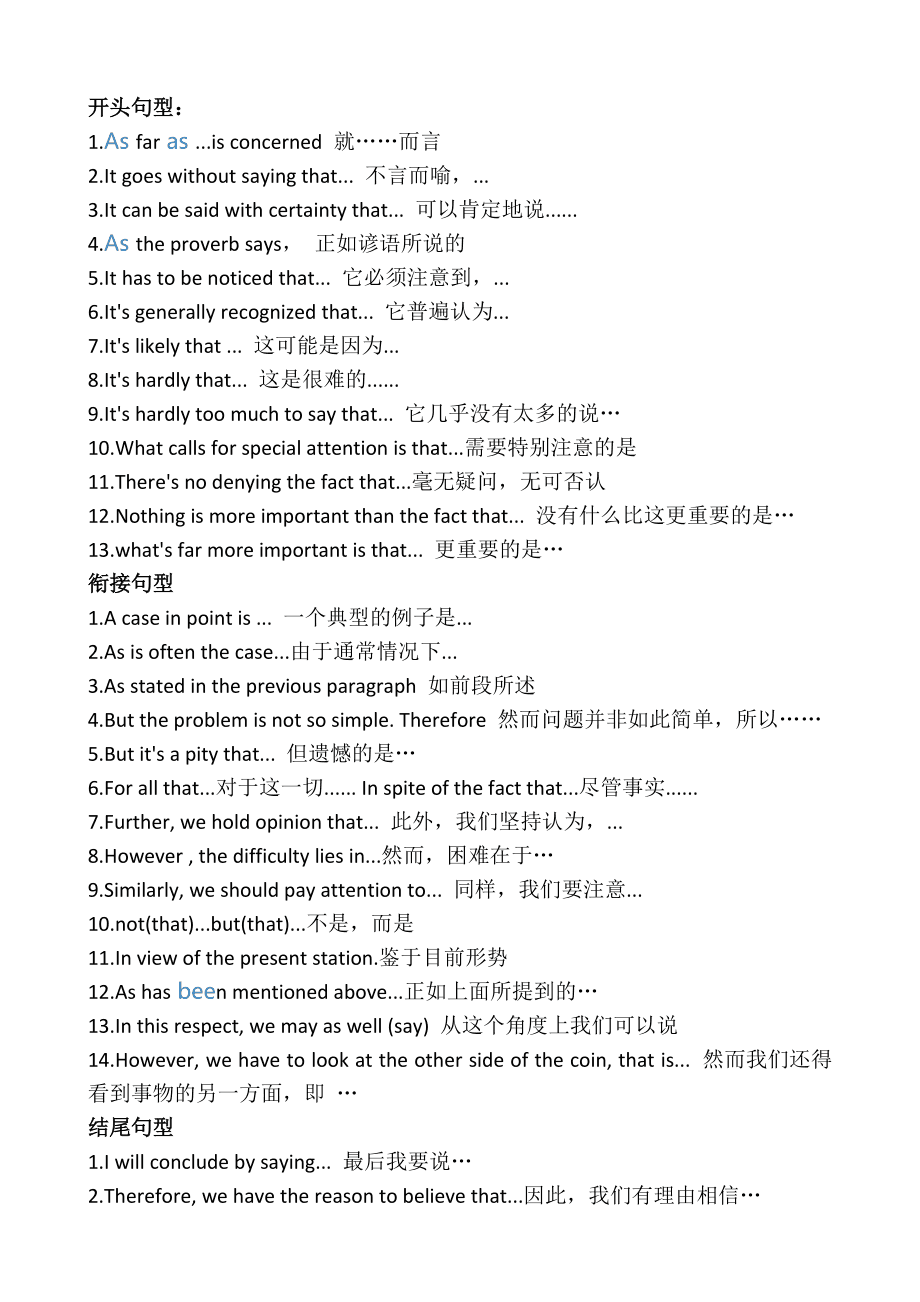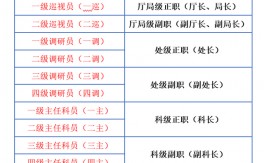英語(yǔ)47個(gè)高級(jí)句型
英語(yǔ)中有許多高級(jí)句型可以幫助你表達(dá)復(fù)雜的概念和想法。以下是一些常用的高級(jí)句型示例:
1. 使用虛擬語(yǔ)氣: "If I were you, I would study English every day."
2. 使用現(xiàn)在分詞作狀語(yǔ): "Having finished his homework, he went out to play."
3. 使用過去分詞作狀語(yǔ): "Given more time, I could have done it better."
4. 使用從句: "Although it was raining, we decided to go for a walk."
5. 使用強(qiáng)調(diào)句型: "It was not until midnight that he finished his homework."
6. 使用比較級(jí): "The more you practice, the better you will become."
7. 使用最高級(jí): "This is the most interesting book I have ever read."
8. 使用條件句: "If you study hard, you will pass the exam."
9. 使用倒裝句: "Not only did he refuse the gift, but he also never spoke to her again."
10. 使用被動(dòng)語(yǔ)態(tài): "The letter was written by Mark Twain."
11. 使用雙重否定: "I cannot say that I have never thought about it."
12. 使用并列句: "She can speak three languages and she is also a talented musician."
13. 使用非限制性定語(yǔ)從句: "My brother, who is a doctor, lives in Canada."
14. 使用獨(dú)立主格結(jié)構(gòu): "The game over, the players left the field."
15. 使用疑問句: "Have you ever been to Paris?"
16. 使用否定疑問句: "Haven't you finished your homework yet?"
17. 使用賓語(yǔ)從句: "I believe that he is honest."
18. 使用主語(yǔ)從句: "What he needs is a good rest."
19. 使用同位語(yǔ): "The fact that she was late surprised everyone."
20. 使用插入語(yǔ): "Obviously, the project is behind schedule."
21. 使用省略句: "If possible, I would like to leave early."
22. 使用強(qiáng)調(diào)句: "Not once did he complain about the work."
23. 使用并列連詞: "He is both intelligent and hardworking."
24. 使用副詞短語(yǔ): "Interestingly enough, the book was a bestseller."
25. 使用介詞短語(yǔ): "He is in charge of the project."
26. 使用并列結(jié)構(gòu): "She likes to read, write, and paint."
27. 使用條件句: "Provided that you work hard, you will succeed."
28. 使用讓步狀語(yǔ)從句: "Despite the bad weather, we went on a picnic."
29. 使用結(jié)果狀語(yǔ)從句: "So tired were we that we fell asleep immediately."
30. 使用目的狀語(yǔ)從句: "He got up early in order to catch the first train."
31. 使用原因狀語(yǔ)從句: "Because it was raining, the game was cancelled."
32. 使用方式狀語(yǔ)從句: "Just as you suggested, I finished the project."
33. 使用時(shí)間狀語(yǔ)從句: "After he had finished his homework, he went out to play."
34. 使用地點(diǎn)狀語(yǔ)從句: "Where there is a will, there is a way."
35. 使用數(shù)量短語(yǔ): "She has a lot of work to do."
36. 使用存在句型: "There is a book on the table."
37. 使用有靈有性的句型: "The wind howled through the trees."
38. 使用無靈主語(yǔ)句型: "The book was written by Shakespeare."
39. 使用強(qiáng)調(diào)句型: "What I need is your support."
40. 使用比較結(jié)構(gòu): "He is taller than I am."
41. 使用省略句: "Would you like to go with us?"
42. 使用并列連詞: "He can play the piano, the violin, and the guitar."
43. 使用副詞短語(yǔ)作狀語(yǔ): "Frankly speaking, I don't agree with you."
44. 使用介詞短語(yǔ)作狀語(yǔ): "With the help of his friends, he finished the project."
45. 使用并列結(jié)構(gòu): "She is a teacher and a writer."
46. 使用條件句: "Should you need any help, please let me know."
47. 使用讓步狀語(yǔ)從句: "Even if it rains, the game will go on."
這些句型可以幫助你提高英語(yǔ)寫作和口語(yǔ)的復(fù)雜性和深度。記住,使用這些句型時(shí),確保它們適合你想要表達(dá)的內(nèi)容和上下文。

65個(gè)高級(jí)句型匯總
高級(jí)句型通常指的是在英語(yǔ)寫作和口語(yǔ)中使用的復(fù)雜且表達(dá)豐富含義的句子結(jié)構(gòu)。以下是一些常見的高級(jí)句型的例子,這些句型可以幫助提升語(yǔ)言的表達(dá)能力和寫作水平:
1. 使用虛擬語(yǔ)氣: If I were you, I would study hard.
2. 使用非謂語(yǔ)動(dòng)詞: Having finished his homework, he went out to play.
3. 使用從句: I don't know whether he will come or not.
4. 使用強(qiáng)調(diào)句: It is not until midnight that he realized his mistake.
5. 使用倒裝句: Not only did he finish his work, but he also helped others.
6. 使用省略句: If you are tired, take a break.
7. 使用并列句: She can speak three languages, and she is also a great singer.
8. 使用條件句: Unless you work hard, you won't succeed.
9. 使用比較級(jí)和最高級(jí): This is the most interesting book I have ever read.
10. 使用被動(dòng)語(yǔ)態(tài): The letter was written by him.
11. 使用疑問句: Have you ever been to Paris?
12. 使用否定句: I don't think that's a good idea.
13. 使用插入語(yǔ): To tell you the truth, I don't agree with you.
14. 使用獨(dú)立主格結(jié)構(gòu): The game over, the players left the field.
15. 使用同位語(yǔ): The fact that he was late surprised everyone.
16. 使用并列連詞: He is both intelligent and hardworking.
17. 使用介詞短語(yǔ): He is good at playing the piano.
18. 使用分詞作狀語(yǔ): Worried about the exam, she couldn't sleep well.
19. 使用直接引語(yǔ): "I'm leaving," she said.
20. 使用間接引語(yǔ): He told me that he was tired.
21. 使用存在句型: There is a book on the table.
22. 使用使役句型: The teacher made the students study.
23. 使用感官動(dòng)詞: I heard her singing in the next room.
24. 使用it作形式主語(yǔ): It is important to study hard.
25. 使用it作形式賓語(yǔ): I find it difficult to solve this problem.
26. 使用that引導(dǎo)的名詞性從句: The fact that he was late again was surprising.
27. 使用wh-詞引導(dǎo)的名詞性從句: I don't know what to do next.
28. 使用現(xiàn)在分詞作定語(yǔ): The boy standing there is my brother.
29. 使用過去分詞作定語(yǔ): The letter written by him was very touching.
30. 使用雙重否定: I can't say that I didn't enjoy the movie.
這些只是一些例子,實(shí)際上高級(jí)句型的種類非常豐富,可以根據(jù)不同的語(yǔ)境和需要進(jìn)行選擇和使用。如果你需要更多的例子或者具體的解釋,請(qǐng)告訴我。
英語(yǔ)的八大句型結(jié)構(gòu)
英語(yǔ)的八大句型結(jié)構(gòu)是英語(yǔ)語(yǔ)法的基礎(chǔ),它們描述了主語(yǔ)和謂語(yǔ)之間可能存在的八種基本關(guān)系。這些句型結(jié)構(gòu)對(duì)于理解和構(gòu)建英語(yǔ)句子至關(guān)重要。以下是這八大句型結(jié)構(gòu)的簡(jiǎn)要說明:
1. S + V (主語(yǔ) + 謂語(yǔ)) - 這是最簡(jiǎn)單的句型,只有主語(yǔ)和謂語(yǔ),通常用于描述狀態(tài)或進(jìn)行時(shí)態(tài)。
- 例句:She sleeps.
2. S + V + O (主語(yǔ) + 謂語(yǔ) + 賓語(yǔ)) - 這個(gè)句型中,謂語(yǔ)后面跟著一個(gè)賓語(yǔ),表示動(dòng)作的接受者。
- 例句:He reads a book.
3. S + V + IO + DO (主語(yǔ) + 謂語(yǔ) + 間接賓語(yǔ) + 直接賓語(yǔ)) - 在這個(gè)句型中,謂語(yǔ)后面有兩個(gè)賓語(yǔ):間接賓語(yǔ)(通常是給予的對(duì)象)和直接賓語(yǔ)(通常是被給予的東西)。
- 例句:She gave her friend a gift.
4. S + V + C (主語(yǔ) + 謂語(yǔ) + 補(bǔ)語(yǔ)) - 補(bǔ)語(yǔ)通常用來補(bǔ)充說明主語(yǔ)或賓語(yǔ),可以是名詞、形容詞或副詞。
- 例句:He became a teacher.
5. S + V + A (主語(yǔ) + 謂語(yǔ) + 狀語(yǔ)) - 狀語(yǔ)用來修飾謂語(yǔ),提供關(guān)于動(dòng)作發(fā)生的時(shí)間、地點(diǎn)、原因、方式等信息。
- 例句:She walks quickly.
6. S + be + P (主語(yǔ) + be 動(dòng)詞 + 表語(yǔ)) - 這個(gè)句型中,be 動(dòng)詞后面跟著一個(gè)表語(yǔ),用來描述主語(yǔ)的狀態(tài)或特征。
- 例句:She is a doctor.
7. S + V + O + OC (主語(yǔ) + 謂語(yǔ) + 賓語(yǔ) + 賓補(bǔ)) - 賓補(bǔ)用來補(bǔ)充說明賓語(yǔ),可以是形容詞、過去分詞或不定式。
- 例句:They elected him president.
8. There be + S + C (存在句型) - 這個(gè)句型用來表達(dá)某地存在某物或某人。
- 例句:There is a book on the table.
這些句型結(jié)構(gòu)是英語(yǔ)句子構(gòu)建的基礎(chǔ),通過它們可以形成各種復(fù)雜的句子。在實(shí)際使用中,這些基本結(jié)構(gòu)可以結(jié)合使用,形成更復(fù)雜的句子。

 微信掃一掃打賞
微信掃一掃打賞











